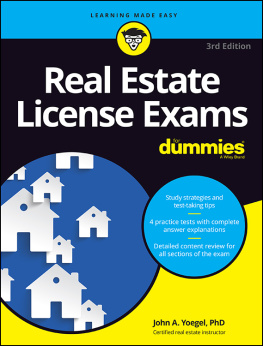Real Insights
By John Graff
Copyright 2021 by Ellimat Books
All rights reserved. No part of this publication may be reproduced, distributed, or transmitted in any form or by any means, including photocopying, recording, or other electronic or mechanical methods, without the prior written permission of the publisher, except in the case of brief quotations embodied in critical reviews and certain other noncommercial uses permitted by copyright law. For permission requests, write to the publisher at the e-mail address below.
ISBN: 979-8-9852750-0-1 (paperback)
Although the advice and information in this book are believed to be accurate and true as of the time of publication, neither the authors nor the publisher can accept any legal responsibility or liability for any inaccuracies or any loss, harm, or injury that comes about from following instructions or advice in the book.
First Edition published by Ellimat Books 2021
Please contact the author at:
john@ashbygraff.com
For Matthew, Elliott, and Cuthbertmy boys.
Introduction
As you prepare to launch your real estate career, you understandably have high hopes for the future. You may know of real estate agents in your area who have a great work-life balance and who maintain an enviable lifestyle. In fact, those successful real estate agents may have inspired you to start your career in this industry.
Depending on which state you are based out of, you may be eyeing an average income of between $40,000 to $65,000. Of course, successful real estate agents can achieve an income that far surpasses the six-figure threshold. This income, combined with the ability to set your own work hours, can seem amazing to someone who is coming off a 9-to-5 grind. That is understandably where your focus is centered. That is what may have pushed you to persevere through your real estate courses.
However, dreaming will not get you where you want to be. The difference between a dream and a goal is a plan. What is your plan after you get licensed?
No real estate agent starts out expecting to fail, but the unfortunate reality is that 87 percent of real estate agents will move on to new career opportunities within their first five years on the job.
There is not a single reason why many new real estate agents throw in the towel, although most of them likely stem from that gray area between dreams and goals. Everything from rapidly changing market conditions to unrealistic expectations about the job and dozens of other reasons could be to blame. Do you have a plan to get through these obstacles, or will you simply continue dreaming about turning over big commission checks?
After you spend months studying to pass the licensing exam and lining up a great broker to work with, you may think that you are positioned for success. But remember, your license is a basic requirement that every new real estate agent must haveit is not a golden ticket. The majority of people who cover the basics by getting licensed will fail in this line of work.
What can you do to set yourself apart from other agents and be part of that 13 percent of real estate agents who have a long and successful career?
A Long, Winding Road Ahead
The reality is that the real estate industry is in a constant state of flux. In fact, it has historically had a fairly reliable cycle with both recessionary dips and profitable peaks. The industry is also intricately linked to a variety of other factors. These include the Feds monetary policy, the mortgage industry, the cost of building supplies, the labor market, and more. It is simply not reasonable to expect your career to be insulated from the ups and downs related to real estate cycles.
Of course, there are a variety of other challenges that you must contend with while navigating through the cyclical ups and downs. For example, you must be able to successfully find potential new clients who are ready to buy or sell soon. Then, you must win over those leads by converting them into clients. This is often easier said than done. After all, other real estate agents will be competing for their business as well.
Once you have sold yourself successfully to a client, you must rely on your knowledge of the local real estate market, harness your negotiation skills, and navigate through a series of pitfalls on each transaction you complete. Rest assured that no two transactions will be the same, and each one will present you with learning opportunities and a few headaches.
There are other challenges to contend with on a more personal level. For example, many people who have been salaried employees underestimate how challenging it can be to stay motivated to put in full-time hours when they do not have regular oversight from a manager. Others may grow frustrated with the fact that they are working so hard now and may not have any financial gains to show for it for a few months down the road. Then there are challenges related to time management, organization, communication, work-life balance, technological expertise, and more.
Education Is the Key to Success
Do you feel discouraged? Before you start to second-guess your new career path, take a deep breath. You are not confronting all of these challenges at once.
You are also not recreating the wheel. While each day as a real estate agent will be filled with experiences that are new to you, they are not necessarily new to the many other real estate agents who came before you. The reality is that you do not have to personally endure all of the stressors associated with launching a new real estate career. Instead, you can focus on education. The more you can learn now, the smoother your path ahead may be.
The most successful real estate agents do not have a know-it-all mentality; they embrace the fact that they still have a lot to learn despite their many years in the business. They also accept the fact that the industry is constantly changing, technologies are evolving, and relationships are growing.
Real estate is not a career where you will ultimately have all of the answers at all times. Instead, it is a career where you will always have the opportunity to grow by expanding your knowledge base and fine-tuning your skills. Your success as a real estate agent is directly linked to education. While you could wait for learning opportunities to hit you in the face, a better idea is to be proactive and seek educational opportunities.
The good news is that you do not have to learn all of the lessons through hard knocks. Instead, you can rely on this guide to navigate some of the more common challenges that new real estate agents face. Each chapter in this guide is filled with insights covering everything from marketing and developing relationships with clients to refining your pricing strategies and more.
By learning more about the challenges that lie in front of you in the months and years to come, you can better prepare yourself for navigating around obstacles that you will inevitably be faced with. After all, you do not necessarily need to endure stress and lose sleep in order to learn the ropes as a real estate agent.
Your Journey Starts Here
As you start your career in real estate, you can and should celebrate the fact that you have aced your courses and passed the licensing exam. In fact, you should celebrate each accomplishment regardless of how seemingly small it is.
You may be inclined to use your commission checks as a yardstick to gauge success. While this is one metric that you can use, understand that there are others. Real estate is a relationship business. Your ability to establish and cultivate relationships is key to your success. With this in mind, another metric to gauge success on is the number of leads you convert into customers. You can also use your referral stats, the deviation between list and sales prices, and a variety of other factors to gauge success in your new career.
Next page









